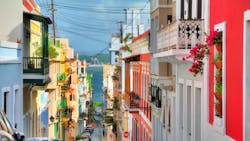U.S. DOE, DHS, HUD Join With Puerto Rico to Modernize Energy Grid
The U.S. Department of Energy has joined the Departments of Homeland Security and Housing and Urban Development, and the Commonwealth of Puerto Rico to launch a new effort to accelerate work to strengthen the island’s grid resilience and advance new initiatives to enhance Puerto Rico’s energy future. The parties executed a Memorandum of Understanding (MOU) that enhances collaboration among federal agencies and the commonwealth, and kickstarts the PR100 Study. The PR100 Study is a community-driven and locally tailored roadmap to help the island meet its target of 100% renewable electricity, improve power sector resiliency and increase access to more affordable energy and cleaner air. Dozens of grid modernization projects will start construction this year, and Puerto Rico’s utility will sign contracts for at least 2 GW of renewable energy and 1 GW of energy storage projects.
From emergency restoration to planning for the long-term recovery of Puerto Rico’s energy sector, DOE, DHS through FEMA, and HUD have been providing hands-on technical assistance to help Puerto Rico plan and prepare to execute over $12 billion in federal recovery and grid modernization funds, efforts that are delivering concrete change in 2022:
- First FEMA Permanent Work Projects Will Begin Construction – FEMA, the Central Office for Recovery, Reconstruction and Resilience (COR3), the Puerto Rico Electric Power Authority (PREPA), and LUMA Energy have established working groups and collaboration processes to reconstruct the island’s electric grid. It is expected that at least 138 projects will be under construction bidding or have begun initial construction activities, including island-wide substation repairs, the replacement of thousands of streetlights across five municipalities, and the creation of an early warning system to improve dam safety.
- Clean Energy Projects Will Move Toward Construction – To achieve its clean energy goals, Puerto Rico is procuring 3750MW of renewable energy and 1500MW of energy storage, enough clean energy to power over 1 million homes. Over the last year, DOE has provided technical assistance to the Government of Puerto Rico to align the procurement process with global best practices and ensure access to capital, to ultimately lower electricity costs for ratepayers who currently pay twice the national average. PREPA is currently in final negotiations of the first tranche of proposed projects: 844 MW of renewable energy, 220 MW of energy storage, and two Virtual Power Plants.
- Implementation of $1.9 billion in HUD grant funding for electrical power system improvements and enhancements- In 2022, the Puerto Rico Department of Housing (PRDOH) will implement an action plan to enhance electrical system reliability and resilience. Puerto Rico’s proposed plan includes the development of both small and large microgrids. The action plan, funded through HUD’s Community Development Block Grant (CDBG) disaster recovery program and developed with assistance from DOE, focuses community investments on vulnerable populations and low-and moderate -income households.
- Emergency Preparedness Tool Will Launch Ahead of the 2022 Hurricane Season – DOE and the Pacific Northwest National Laboratory (PNNL) are developing a tool that will combine detailed models of the Puerto Rico electric system with hurricane forecasting to help the Government of Puerto Rico better prepare in the days leading up to a hurricane in order to accelerate the immediate response and save lives. This tool is being developed specifically for Puerto Rico in close partnership with the utility.
As dozens of new energy recovery projects move rapidly towards construction, DOE is leveraging the expertise and advanced modeling capabilities of its National Labs with the launch of the Puerto Rico Grid Resilience and Transition to 100% Renewable Energy (PR100) Study, designed to ensure that funded energy recovery actions align with Puerto Rico energy policy and resilience needs, are coordinated across sectors, and align with industry best practices. Led by the National Renewable Energy Laboratory (NREL), the study will connect local decision makers and communities with tools, training, and analytical support to enable planning and operation of the Commonwealth’s power grid with greater resilience against disruption as it moves toward its 100% renewable energy goal.
Specifically, the PR100 Study will:
- Engage stakeholders and assess climate risks through the lens of energy justice – Extensive community engagement will inform the development of scenarios that reflect local perspectives and priorities to meet the Commonwealth’s goal of 100% renewable energy by 2050. Energy justice considerations and climate risk assessments will be incorporated into the study’s modeling efforts.
- Assess the full potential of renewable energy – Generation of high-quality input data such as resource potential, detailed demand projections, and distributed energy resource adoption will inform scenario generation and modeling.
- Model clean energy scenarios – Based on stakeholder input and data, the research team will select detailed feasible pathways to 100% renewable energy, and then model their potential to meet resilience, reliability, affordability, and safety objectives.
- Analyze system reliability, resilience, and economic impact – Analysis of the implications of 100% renewable electricity on the power system and associated economic and workforce development will be evaluated and incorporated into the final deliverables.
The PR100 Study is funded by FEMA through an interagency agreement with DOE's Office of Electricity to support recovery efforts in the island's energy sector leveraging the expertise and capabilities of the National Laboratories including Argonne, Lawrence Berkeley, NREL, Oak Ridge, PNNL, and Sandia. The PR100 Study is modeled after the Los Angeles “100% Renewable Energy Study” (LA100), which evaluated a wide range of future scenarios to help Los Angeles understand options for and implications of meeting its renewable energy goals. Study results showed that meeting Los Angeles’ goal of reliable, 100% renewable electricity by 2045—or even 2035—is achievable, and will provide benefits related to air quality, greenhouse gas emissions, and public health if coupled with electrification of other sectors.
